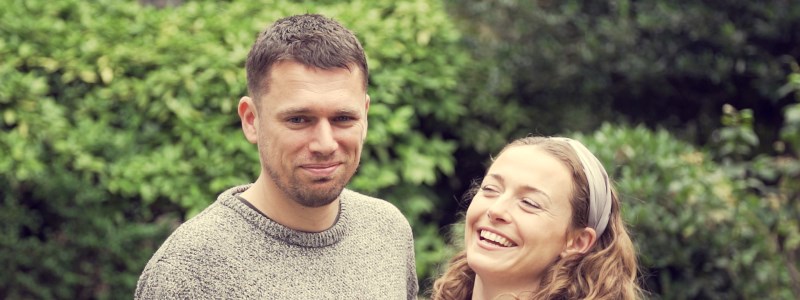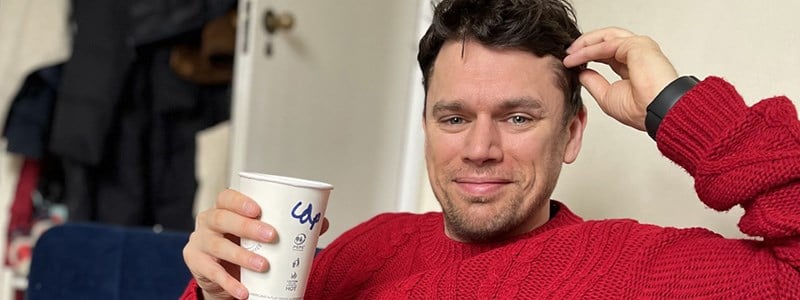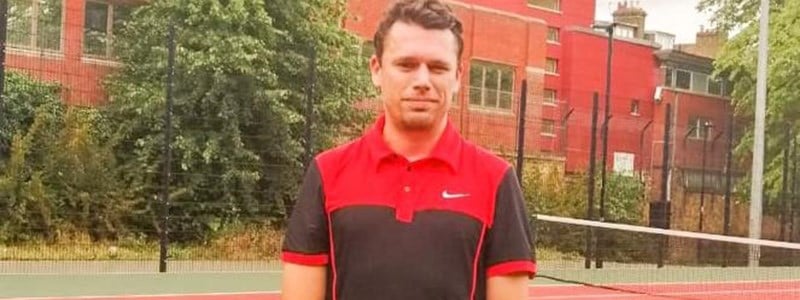
Tennis, volunteering and accepting help – how Steve McCann turned his life around after struggling with addiction and mental health issues
• 9 MINUTE READ
20 years of addiction and mental health issues had taken a huge toll on Steve. By accepting help, volunteering, and a programme of recovery, Steve has turned his life around, one day at a time - and a big part of that recovery has been a rediscovery of his love of tennis.
I’d always felt like an outsider ever since I was a kid. I would hang around in large groups and appear fine but inside I was always deeply uncomfortable in my own skin. When I was older and discovered alcohol, that’s when I finally had something to numb myself to these feelings.
I'd throw myself into everything to distract myself from how I felt. Football, films, books, history, music, studying sharks, anything I could immerse myself in, I did.
I used to play a lot of tennis and fell in love with the sport at a young age, but sadly I stopped in my late teens, which meant I was doing far less exercise than I had in the past. Back then I never wanted to start again – I always felt the road back to getting to where I used to be was too long so I left it.
I couldn’t sit and read a book for too long on my own without feeling I should be doing something else. If I was left with my own thoughts, I was usually quickly outnumbered. I ran on nervous energy and it was totally exhausting.

Hitting 'rock bottom'
My ‘rock bottom’ wasn't one individual incident, it was the last in a long line of behaving badly and my life being out of control. I couldn’t drink much before blacking out entirely, though I didn’t get that until my late 20s. I was sick and tired of being sick and tired, but I thought that this was the way I had to live.
I vividly remember sitting on my bed drinking from a red wine bottle and asking myself, ‘why can’t I just stop?!’, before continuing, ending up in some random pub surrounded by people looking for the same things as me. Misery loves company. I put myself in very dangerous situations and was lucky to escape with my life on a number of occasions.
I was broken and wanted to change.
I met my partner six months before I got sober, still locked into my addiction. After the latest incident, we spoke candidly, and I had the familiar feeling of being about to lose a relationship with someone great because of my drinking. It was overpowering and felt beyond my control. I was not fit to be a partner and I wanted to disappear.
Incredibly, my partner gave me a chance to fix myself. We wrote down a plan which had 10 points. I remember writing it thinking that I might as well be writing: ‘1. Fly to the Moon’, 2. Live to 200 years old’. I didn't think I had a chance. I remember thinking that I would be dead soon and being powerless to stop it. I was broken and wanted to change. My hell was very private, and I had never discussed it with anyone.
The road to recovery
In July 2018 I went to the doctor. For the first time in my life, I was honest with a healthcare professional. I’d always been very underweight and now this also became something that gripped me. I was making myself sick daily at this point. I would never have admitted this then, but that is the reality of the situation. I was referred to the ‘Hackney Recovery Centre’ where I spoke to someone about what was happening to me for the first time. After a challenging start, the final few sessions were fantastic and I took up the suggestion that I continued therapy privately which I did, until about a year ago, with life-changing results. They gave me a roadmap to recovery and I honestly don’t think I’d be here without it.

No.3 on the list was to join a 12-step recovery programme. I thought I’d struggle to find one, but, like Diagon Alley in Harry Potter, this whole new world was hidden in a series of community centres, school gyms, churches and basically anywhere that a group of people can get together and drink bad coffee.
A 12-step programme saved my life and continues to do so. I went to over 100 meetings in the first 90 days and now go to one 4-5 times a week. I was so sceptical of it and tried to look for another way but there was no other way for me, I had nothing left. As we say in recovery, ‘I was given the gift of desperation’.
Upon writing this article, I went back to the beginning of my sobriety journey to see what my thinking was like. I kept a diary of my recovery (the nights are very long when you don't go to pubs, so I had to do something). Words like lonely, scared, ashamed, confused, death and fear came up a lot. I see that person with compassion now; I wasn’t a bad person turning good, I was a sick person getting well.
I was three years sober on 8 July 2021. Before I sought help, I could barely make a week. I have a network of people around me who help me to maintain this and I feel supported.
Life today
I cannot adequately describe how different my life is today. I am valued at work, known for my work ethic, positivity, and honesty. I am the company first aid officer and helped people during lockdown with their own mental health issues. Being trusted to be the person people go to is truly humbling for me.
Every single day, I look to see what more I can do, the opposite of my former self, entirely.
I delivered food parcels during lockdown and still do. I volunteer with the homeless, sit on local committees, pick up litter in the area I am grateful to live in and I mentor students from disadvantaged backgrounds. My charity work enables me to get out of my head and be useful. The opposite of addiction is connection. Every single day, I look to see what more I can do, the opposite of my former self, entirely.
I was not present when I was in addiction. Now, I am a doting uncle to my two nieces who I hope will grow up with only experiences of me like this. I sponsor two people in their own recovery journey which helps me, every day. I’ve had friends of mine, friends of friends and even people from school who I've not spoken to in years, reach out and tell me that they have appreciated hearing about my story and want advice.
Getting back on the tennis court
I’m the fittest I’ve been since I was 18 and have put on weight and I eat sensibly. My mind is like that of a different person.
A huge improvement to my life which has provided me joy and connection again is that I have started playing tennis again after 20 years. This improved my mental and physical health dramatically and allowed me to meet new people.

I wanted to play competitive tennis again, so I signed up to my Highbury Local Tennis League. I must admit I was very rusty in my first match and couldn’t string together more than three shots in a row. I have a notebook I fill in after matches and lessons with a ‘pros and cons’ and the ‘pros’ list was empty, with the corresponding ‘cons’ list having about 15 examples of negativity from the match.
I then told Elle that perhaps tennis was not for me and that that window was shut to me after being out for so long but about two or three days later, I returned to the list and added in the ‘pros’; ‘I am playing tennis again after 20 years’, ‘I am playing competitive sport again’ and ‘I am well enough to play again’, ‘playing tennis outdoors in a park is beautiful’ and suddenly, the list did not look so bad.
I now play two or three times a week with the aim of making the Highbury Tennis Men’s Team. I love playing, have got some old friends hitting with me again, and have a brand new circle of people that I now play with. Playing again is a joy in my life that has brightened it in so many ways.
The LTA were incredibly supportive of my journey back to playing and did a short film about it. From this, I had more people reach out to talk which was amazing, many of which have now become my friends.
With this passion for reconnecting with old hobbies, I started painting during lockdown for the first time in 20 years and made gifts of them to my friends and family. I wrote letters to people and started writing again, another passion of mine that I neglected for years. Some of it is terrible and some of it is OK, and that’s just fine.
I am now a positive person looking forward to living my life and turning up, giving my best and being helpful. When a bad day comes along, I know it will pass and I will be OK. I hope my story can inspire others to take the same steps. You do it by putting one foot in front of the other. It does require action on your part, but you will be amazed at how many compassionate people are out there who will be happy to help.
On 3 July 2021 Steve asked his partner, Elle to marry him and she said yes - they intend to get married in September 2022.
If our are having a difficult time or need someone to talk to, you can contact a Samaritan on 116 123, any time of day or night - visit https://www.samaritans.org/ for more. Further information on support that is available can also be found on the MIND website: https://www.mind.org.uk/information-support/guides-to-support-and-services/.





